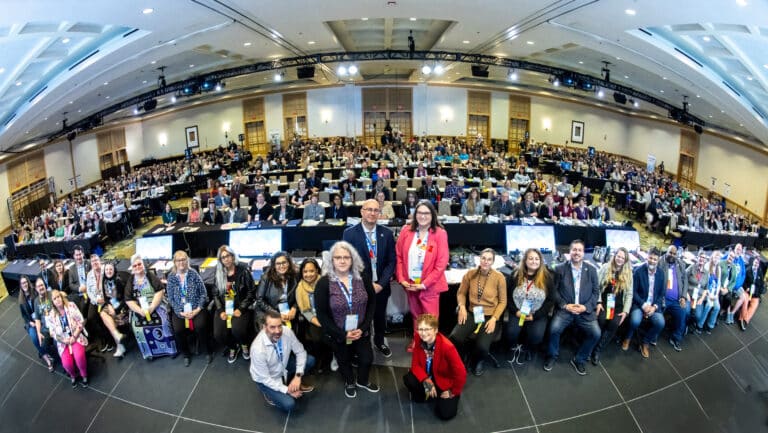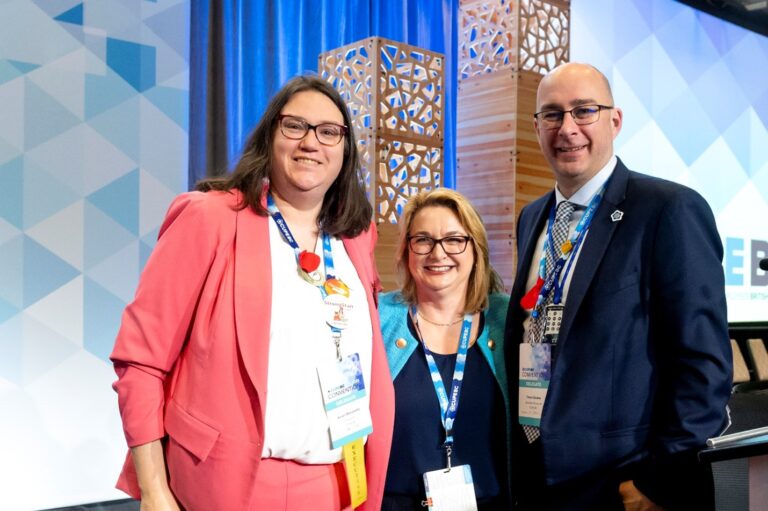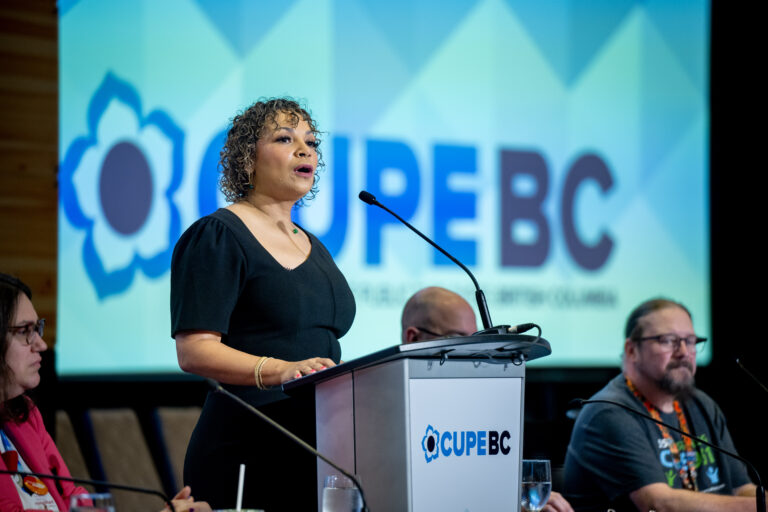POWELL RIVER – Residents packed the Recreation Centre here last night to talk about the City’s plans to turn public wastewater treatment over to Catalyst Paper, a private company. The Powell River Water Watch Coalition sponsored the meeting where residents strongly voiced their desire to keep it public and their dissatisfaction with the City’s rush and the complete lack of public consultation.
The meeting opened with an overview by Karen Skadsheim, who noted that the goal of the coalition is to “maintain public ownership of water and water-related utilities.” Coalition membership currently includes CUPE Local 798, the Council of Canadians, three ratepayers groups – Townsite, Cranberry, and Wildwood – and the Sierra Club (Malaspina Group).
Skadsheim’s slide presentation addressed why Powell River needs a new treatment plant and detailed the options, process and problems with the City’s agreement in principle, which includes capping Catalyst’s taxes and giving the corporation a twenty-year contract. She noted that the City of Quesnel pays less than half of what the Powell River plan calls for as payment to Catalyst.
“If taxpayers pay this unnecessary fee, it amounts to taxpayers subsidizing Catalyst’s operations,” said Skadsheim. Reviewing the timeline of the agreement, and added, “We don’t even have a business plan yet.”
Skadsheim said that the City’s engineering department reported last week that critical processes like obtaining permits and approvals from the Ministry of the Environment, conducting technical studies, applying for government grants, and meeting legal obligations in dealing with Catalyst needed to move forward concurrently. Staff warned that the timeline was very suspect and that there is a lot of risk both in the parallel process and in fast-tracking the agreement.
Skadsheim noted that the deal-breaker for her was losing public control of water. “We absolutely cannot let corporations gain control of water in any fashion. Period.”
Judy Watts, chairperson for the Townsite Ratepayers Association, emceed the discussion. She thanked everyone for attending, went over the evening’s agenda, introduced the speakers and moderated the Q&A portion of the evening.
Powell River-Sunshine Coast NDP MLA Nicholas Simons said it is a positive action for community members to let their municipal representatives know how they feel and to push for the protection of public resources for future generations. Simons said that in the Legislature he asked Minister Bill Bennett to ensure that public consultation was in the forefront.
“It is not in the public interest to negotiate deals quickly and under pressure,” said Simons. “The only negotiations that should be done quickly are hostage negotiations. And we’re not in a hostage situation.”
Simons said that we have public infrastructure that needs construction and it should be kept in public hands. He noted that there are no funds specified for the wastewater treatment project in the public treasury. He called into question where the money was coming from. “We need to ask questions – ask the Minister who’s responsible for Community Development, ask the Minister of the Environment.”
CUPE National anti-privatization coordinator Robin Roff shared experiences from communities that had privatized water services and gave strong evidence of why these schemes don’t work. She noted that water and wastewater systems were some of the most important core services that governments provide for their citizens.
Roff gave real-world experiences of problems with privatized services in B.C. and beyond. In Hamilton, contracting out the treatment plant to a private operator led to increased user charges and exorbitant costs to the City – including legal costs to sue the private company when it refused to take responsibility for a spill of 182 million litres of raw sewage that flooded almost 200 homes.
More recently, in Brussels a group of private companies known as Aquiris not only failed to deliver on its promise to provide a cutting-edge treatment system, the one it designed was for industrial, not urban sewage and could not properly process the City’s waste. Aquiris demanded an additional 40 million Euros and, when the City tried to enforce the contract, shut the plant down for 10 days and dumped the untreated wastewater from 1.1 million people into the local rivers.
“Because of these and countless other similar stories, many Canadian municipalities are opting to keep wastewater treatment publicly operated,” said Roff. She noted that Vancouver Island’s Capital Regional District just voted to pursue public operation of its planned wastewater system. Privatization was found to be more expensive, risky and publicly undesirable.
Roff cautioned that whatever Powell River ends up doing to solve its tax problems, it should not privatize this vital municipal service.
“With continued public operations, Powell River can be assured the highest standards of safety, the most efficient and cost-effective service, and the accountability and transparency necessary to protect the health of the environment and residents,” concluded Roff.
The final speaker was Trish Cocksedge, representing the Powell River Water Watch Coalition. She spoke about the state of democracy and the importance of accountability and transparency in good decision-making. She gave an historic perspective of the demise of democracy including how the IMF, World Bank and WTO have all been used to replace democratic decision-making with processes dominated by corporate interests.
“But this could not have happened without our full participation – via our non-involvement,” said Cocksedge. She noted that it is “not the hens in charge of the proverbial henhouse anymore, it is the foxes.”
“Look at Catalyst reducing its role in the community in respect to both jobs and tax dollars, threatening not to pay their taxes. Can we as citizens do that?”
Cocksedge urged local residents to start thinking more about the democratic process and how to make it work for all of us. “We can start demanding real consultation, not backroom deals and then superficial communication about those deals.”
She noted that when people stand up to big business, big money and big development, they have been labeled as CAVE people (Citizens Against Virtually Everything). Cocksedge said that the Powell River Water Coalition are CAVE people – Citizens Advocating Values and Ethics.
She concluded with author Alice Walker’s famous quote: “The most common way people give up their power is by thinking they don’t have any.”
Maggie Hathaway was the only member of Powell River municipal council to attend this important public meeting.
After an impassioned question and answer period, participants put stars on a poster to indicate whether they supported public treatment of wastewater in Powell River or the Catalyst option. The tally of those who voted: Public 54 / Catalyst 0.
View photos.





